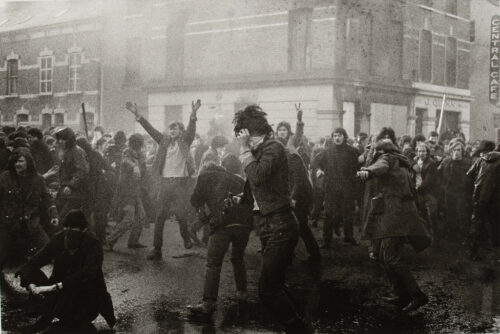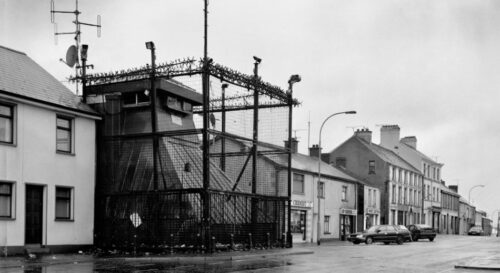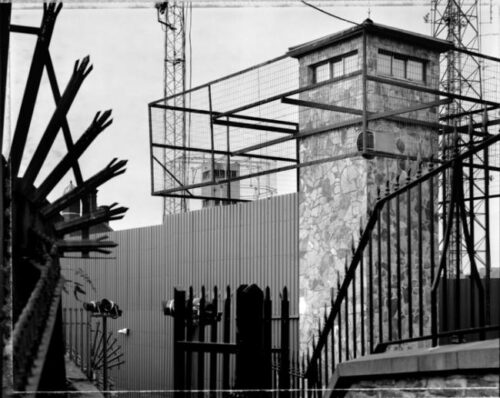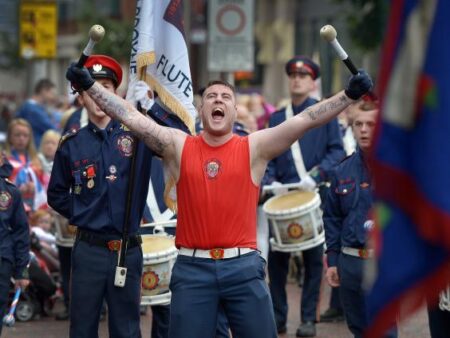
A scene from Bloody Sunday.
Northern Ireland in 1976 was an early exhibit of a first world country that had been torn into factions by Protestant bigotry and fear and by a resultant Catholic resistance and fury. The British Army stood at the center. More often than not, because of poor decisions by English politicians and the actions of one terrible day, Bloody Sunday, January of 1972 when paratroopers killed 13 Civil Rights marchers, the Army was was actively fighting IRA guerillas.
In Northern Ireland, neighbor fought neighbor, and entire communities physically shifted into almost purely Catholic and Protestant residents. Instead of ethnic cleansing, this was religious cleansing. From the height of a bus seat, I could look into side streets and see 10 foot high cinder block walls capped with wire and broken bottles, sometimes an additional 10 feet of chain link. They ran down the middle of the roadway, covered on either side with spray painted slogans: Up the Provos, We Live By The Gun, You Are Now Entering Free Derry.
Our bus stopped at a military checkpoint as we entered the Six Counties. A gate threaded with barbed wire blocked the road. Sand bagged bunkers manned by machine gunners flanked either side of the gate. Tony and I were seated close to the back of the bus on the right. I had the window seat.
Two British soldiers wearing red berets came on board. The officer in front, a man behind him carrying a machine gun slung so its barrel pointed down and to the left. They were very young, our age, maybe a year or two older. The officer walked down the aisle occasionally stopping to ask for ID. He looked us over but did not speak to us. Outside, I watched another soldier take an extending wand with a mirror at its tip and slowly scan the undercarriage of the bus from engine to gas tank. They were checking for bombs.
We passed through 2, maybe 3 more check points before we reached Londonderry where we had to transfer to another line for our drive to Larne and the ferry to Scotland.

British Army outpost. Imagine this in your neighborhood.
From our seats, we saw the physical effects of a terrible collapse of a society. Armored cars at intersections, ugly graffiti everywhere, so many streets divided by those awful walls, and out of synch on this sunny day, a sun that seemed to emphasize the drab greys and browns of tenement houses, squat, narrow 2 story homes connected for entire blocks wall to wall. No side passages, just this solid mass as if they had been set down in one piece. On hillsides they looked like a line of collapsed dominoes.
In Londonderry we pulled into an expansive bus yard and a one room office and waiting area. Our driver told us we should not leave the bus yard. Our next ride would be there soon enough. Besides, it was just too dangerous to go wandering about.
Across the street, the British had constructed a fort. We walked to the edge of the lot, our packs hoisted over one shoulder, and we looked. We had never seen anything like this.

The best photo of the Brit outpost I could find. When we saw it, the towers did not have the fencing around the top. I think we were afraid to take our own photos.
The steel plates were joined piece to upright piece, streaked with rust and rose 20, maybe 30 feet and were adorned with ascending rows of razor wire. Observation towers were placed at either end and one over the main gate. We walked toward the gate, the bus yard wall a solid presence on our left. The sidewalk was very narrow. We stopped at the edge of the wall, at the edge of the block. A street intersected with the entrance to the Base. We could not see down the street. We must have been commenting on all this, but I cannot remember what we said.
The entrance was strange. Another wall rose up maybe 15 feet inside and steel rails ensured that any vehicle entering would have to come to a complete stop and make an abrupt turn to the right. Later, we understood. No vehicle, a truck carrying a bomb let’s say, could smash through the gate and into the heart of the Post. The extreme turn was meant to prevent that kind of attack.
Within a minute of our pause at the edge of the block across from the gate, we heard running coming from down the street toward us, from our blind side. Many feet running, a patterned sound, not a crowd rushing in panic. Four British soldiers in berets in single file appeared running at a double time clip, the man in front, the officer or noncom holding his weapon up, not aiming, the barrel slightly dipped. He was scanning the space to both sides when he saw us and barked a command, I could not make out the word. The three behind him swiveled toward us, the last man had been running backwards and covering their rear. We had four automatic weapons pointed at us. This all happened in a second, maybe two or three at most. They took us in at a glance — tall, backpacks, hiking boots, shocked faces, our hands visible — and then it was over, and they had disappeared inside the gate.
I don’t remember what Tony and I said to each other. I don’t remember getting onto the second bus. I don’t remember my emotions. I remember only leaving Derry and its smoky air and seeing green fields again.
Now I only wonder at our naivete. Two Americans on a lark traveling through a region engulfed in war, acting as if we were God’s Fools, protected from all harm by our innocence.
At the Ferry line in Larne we saw what Orange Day meant. Londonderry, Belfast and Glasgow exchange fife and drum corps for marches meant to commemorate the Battle of the Boyne and cause as much pain to Catholics as possible.

Obviously, a more recent Orange Day photo, but the man in red gives you a very good idea of the makeup and demeanor of the men we saw.
We stepped in line behind a very tall man with shoulder length black hair who wore razor blades as earrings, a razor blade attached by a thin chain dangled from each ear, its cutting surface unsheathed. He was a jolly man who spoke to us expansively, our backpacker ‘uniform’ serving to make us harmless. We might have understood a few words from every other sentence. He lightly swung a six pack of malt liquor, some of its plastic tabs emptied. He must have offered us a drink, but I don’t remember. He was a member of one of several fife and drum corps traveling from the North to Glasgow. They had all been drinking. Already we could small vomit. Tony wondered if this wasn’t what the damn Visigoths looked like when they pillaged Rome.
There were Bobbies everywhere. We entered the bar/cafe area at the front of the ferry but the bar had been shut down. I don’t remember when the fights began, but the police flew into the bar, going after and tackling drunken, shouting Irishmen. One man swung a mace or baton at the police, the ceremonial staff the drum major carries at the head of the corps and twirls like a magic wand. He made it a weapon. I saw him go down under 2 officers.
We got out and tried to put distance between ourselves and the riot. We passed the trip across with a crew of older women wearing cloth coats and little hats, the whole set of us thoroughly sober and shaken.
At Stranraer we took a bus to Glasgow and in leaving the parking lot, drove by a straight line of 15 or 20 young men pissing off the side of the road. I think the older women were giggling.
It was late when we arrived at our B and B in Glasgow. We had spent all day on buses and a ship and had witnessed scenes that seared themselves into us, but we were both exhausted and buoyant, resilient in our youth, unthinkingly convinced of our immortality, laughing about what had happened on the ferry. We collapsed into chairs in the parlor and ate bread and drank tea and watched the evening news. On this, the day before Orange Day, bombs had gone off all over Derry.